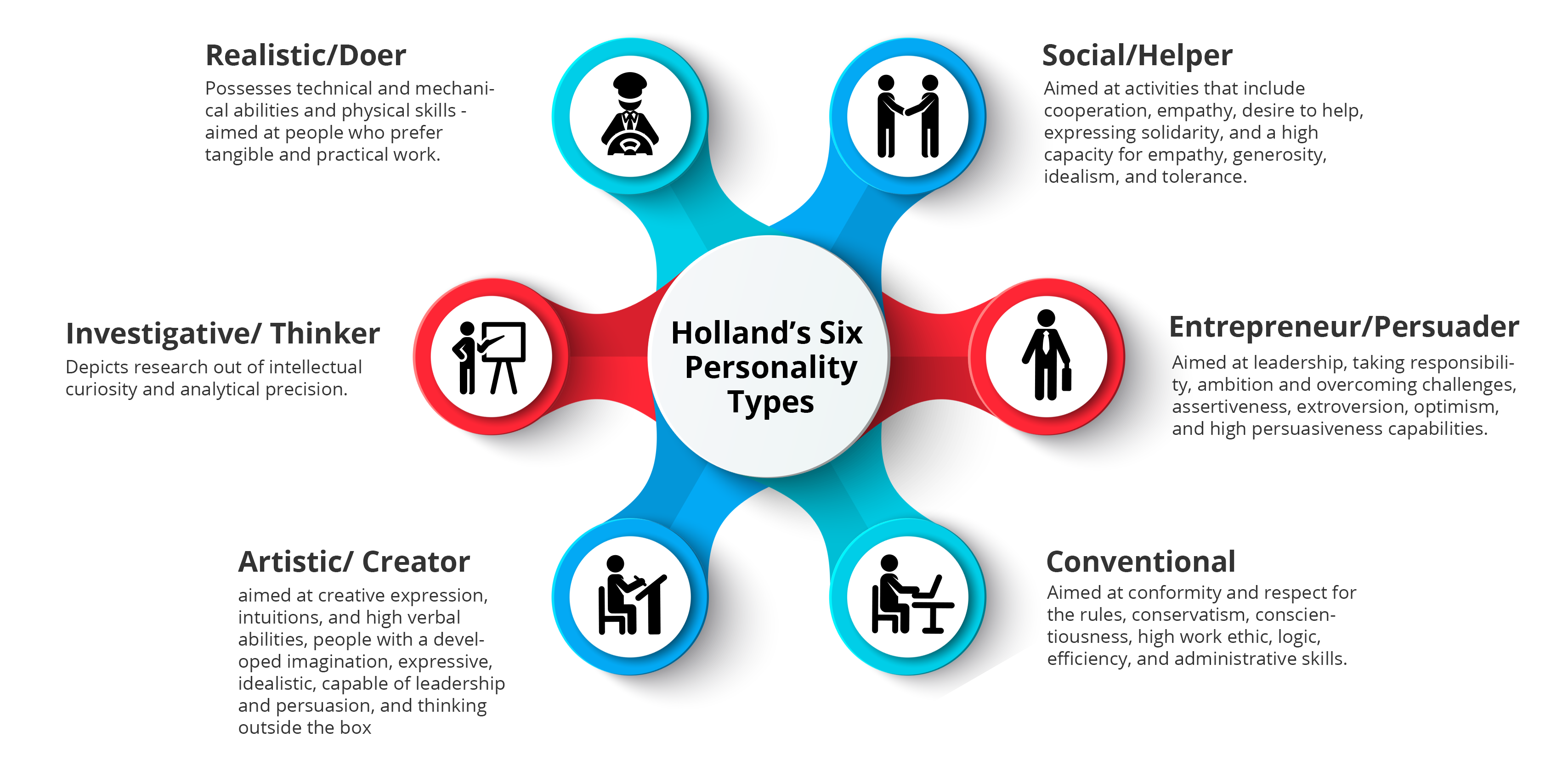(1959) A Theory of Vocational Choice. Holland, J. L.
We all heard the question "what do you want to do when you grow up?" at some time during our lives, but few of us have stopped to think about what is suitable for us to practice.
The understanding that we are all unique and possess different personality characteristics brings with it the search for adaptations of other areas in our lives to these characteristics in general and the choice of a profession in particular. Even before computers entered our lives, to find the ideal job, it was customary to use books or written guides to get information about the available professions. However, following the transition to a computerized database, the available information on the work market is more extensive, allowing easier access and higher relevance, but at the same time can be confusing. Therefore, in recent years, emphasis has been placed on choosing the best professional match between the qualities of candidates and the growing diversity of the work market.
John L. Holland proposed in 1959 the theory of professional choice, which aims to characterize behavior and occupational environment and to be a practical basis for professional satisfaction in people. Although Holland's theory was published in the 1950s, it is still relevant. Moreover, it serves as a stepping stone for many places that offer occupational training since the model is easy to understand, accessible, relevant across various studies and cultures, and contains a wide variety of knowledge sources.
The theory includes features related to the occupational structure that reflects a person's ambitions, knowledge, personality, personal history and abilities, and six common types of social-physical environments. Each of the environments proposed by Holland is characterized and dominated by a classification or several different classifications of types. A correct combination of personality type and work environment leads to desired results such as job satisfaction, achievements, professional stability, and, more importantly - the realization of the employee's personal potential.
The occupational classification of Holland is done by dividing it into six personality types or characteristics, each of which is given a high/low score according to a person's abilities, preferences, and desires. These are the classifications:
• Realistic or Doer - possesses technical and mechanical abilities and physical skills - aimed at people who prefer tangible and practical work - for example: technicians, drivers, mechanical engineers, carpenters, and landscape architects.
• Investigative or Thinker - depicts research out of intellectual curiosity and analytical precision — characteristic of professionals such as financial experts, teachers, physicists, pharmacists, and doctors.
• Artistic or Creator - aimed at creative expression, intuitions, and high verbal abilities, people with a developed imagination, expressive, idealistic, capable of leadership and persuasion, and thinking outside the box. Professions such as designers (clothing\landscape\interior), graphic artists, and photographers will suit this type.
• Social or Helper - aimed at activities that include cooperation, empathy, desire to help, expressing solidarity, and a high capacity for empathy, generosity, idealism, and tolerance. It will usually suit professions such as nurses, psychologists, occupational therapists, and social workers.
• Entrepreneur or Persuader - aimed at leadership, taking responsibility, ambition and overcoming challenges, assertiveness, extroversion, optimism, and high persuasiveness capabilities. Suitable for various managerial positions as well as entrepreneurs, publicists, real estate brokers, and more.
• Conventional or Administrative - aimed at conformity and respect for the rules, conservatism, conscientiousness, high work ethic, logic, efficiency, and administrative skills. Data management, accounting, and treasury professions can fit this type.

With the help of Holland's theory, which serves as a basis for occupational diagnosis, it is possible to determine to which type or collection of types the person belongs and match him with the ideal profession. Furthermore, the characterization can be done according to one or more types in order to express the complexity of different personalities as close as possible to reality. In addition, by combining the knowledge about the different types and work environments, it is possible to perform a preliminary screening for positions in an easy, efficient, and highly predictive manner that yields better results for the business selecting candidates for the position and better results for job seekers.
We at Logipass invested significant effort in 2020-2021 in building a system that allows any employer to use our tools in order to test a candidate for a wide variety of positions in combination with Holland's theory. In addition, we offer reliable, high-quality, and computerized professional guidance, that issues detailed and comparative reports about the examinees, enabling better and more accurate decision-making regarding their professional future.

We would be happy to hear your opinion!
LogiPass has dozens of additional articles dealing with issues of screening tests, career guidance and other interesting issues from the world of work.